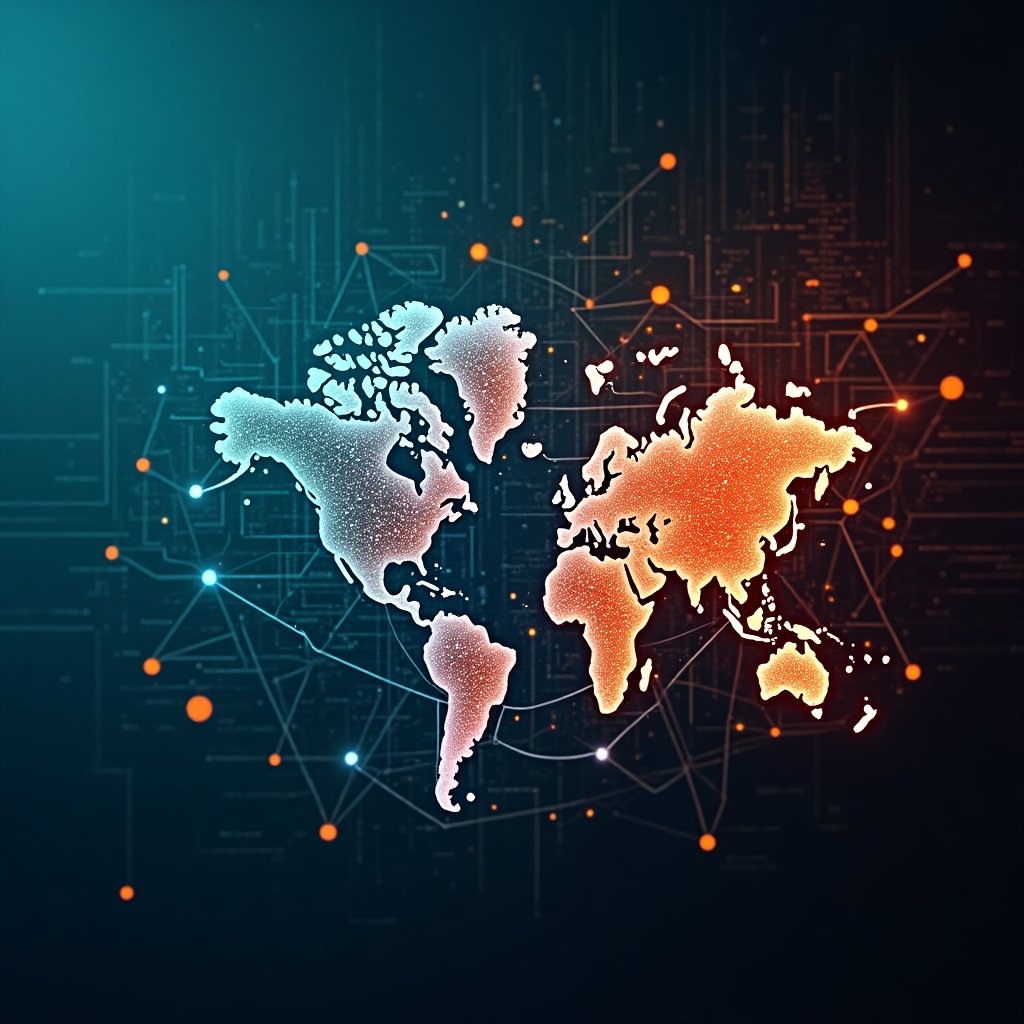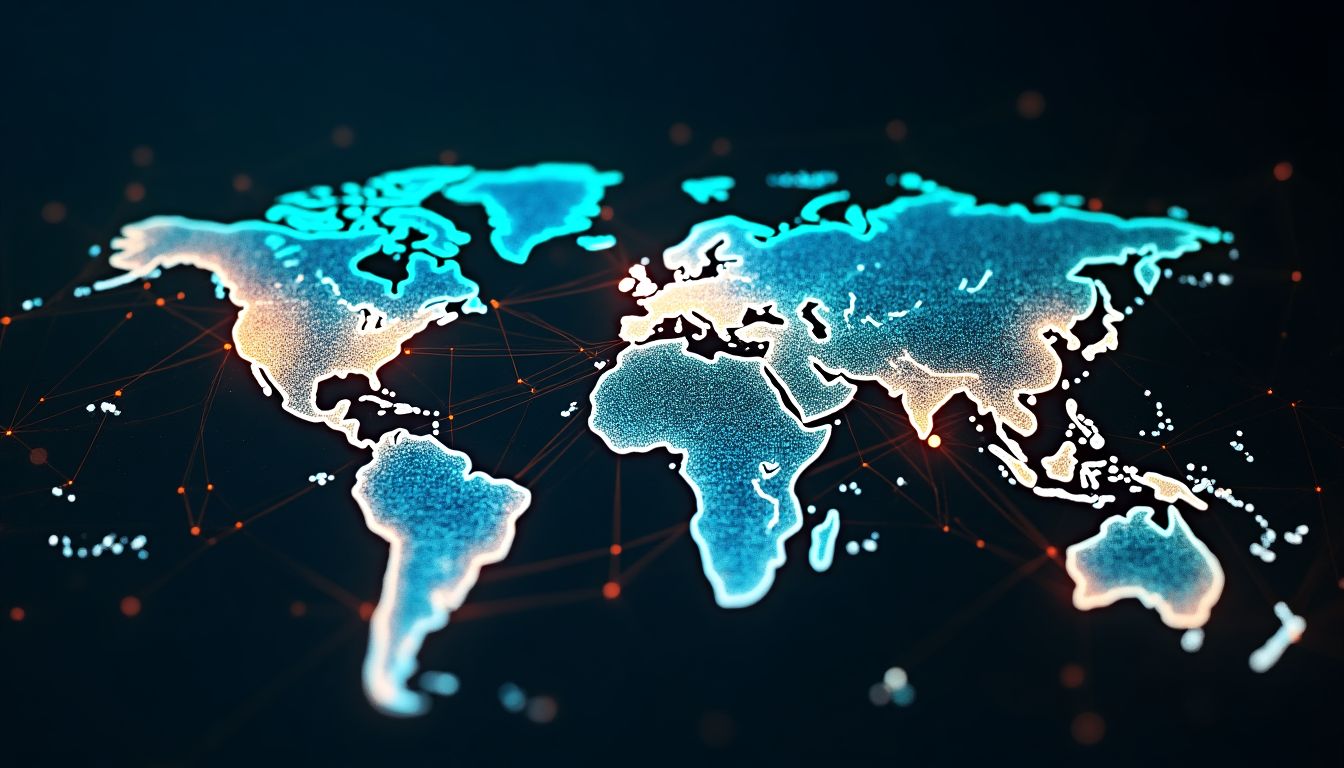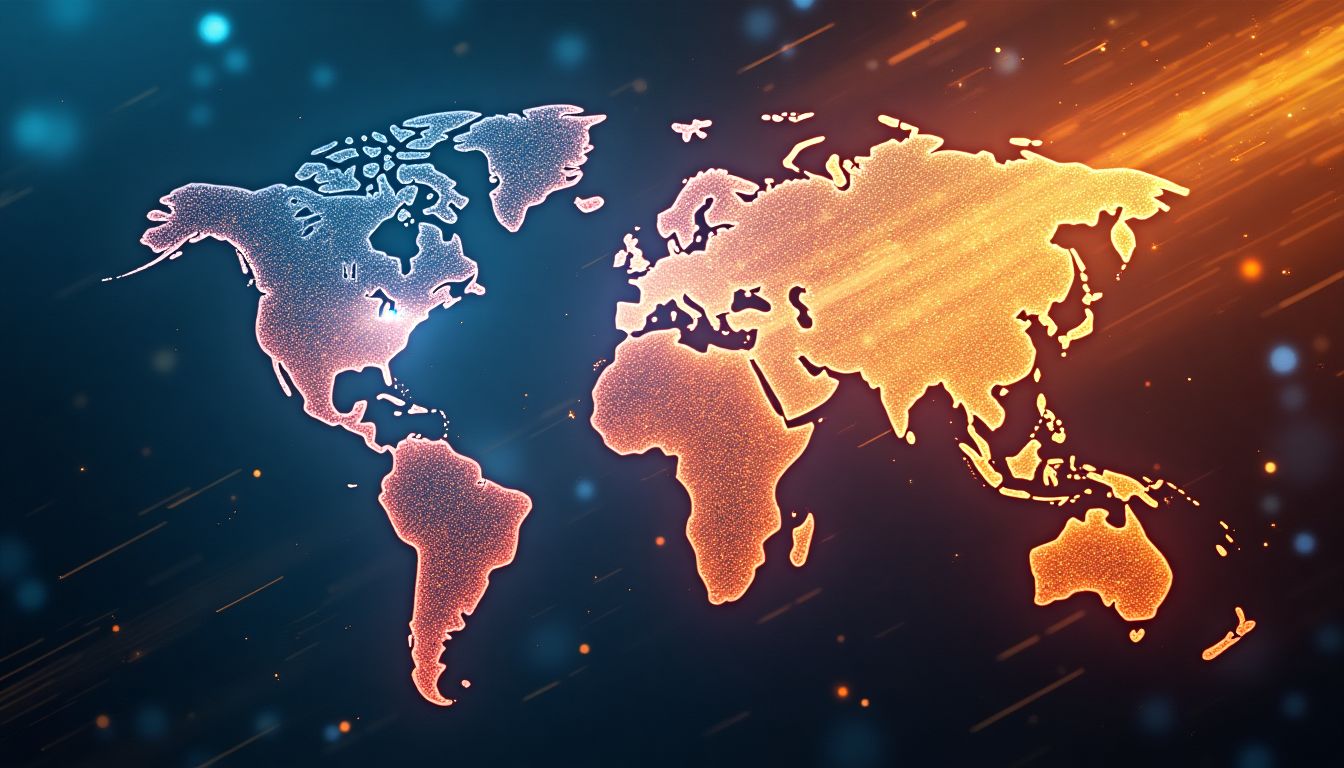The AGI Arms Race: How Superpowers Are Competing for Machine Intelligence
"Progress is impossible without change, and those who cannot change their minds cannot change anything." – George Bernard Shaw. But what happens when progress is driven not by human minds, but by artificial ones? In 2025, the race for Artificial General Intelligence (AGI) has become the defining struggle of the 21st century. Unlike the Cold War’s nuclear arms race, this battle is fought in labs, data centers, and boardrooms, with algorithms as the weapons and data as the ammunition. The stakes? Nothing less than global supremacy.
AGI, the hypothetical intelligence of machines that can understand, learn, and apply knowledge across any domain at or beyond human levels, is no longer science fiction. It’s a rapidly approaching reality, and superpowers are vying to be the first to harness its potential. The U.S., China, the EU, and others are pouring billions into AGI research, sparking fears of a new geopolitical crisis. Will this race lead to unparalleled prosperity or catastrophic conflict?
Stephen Hawking once warned, "The development of full artificial intelligence could spell the end of the human race." Meanwhile, Ray Kurzweil, a futurist and Google’s director of engineering, envisions a future where AGI surpasses human intelligence, leading to what he calls "the Singularity." And Yuval Noah Harari, author of "Sapiens," argues that AGI could fundamentally alter what it means to be human. Their perspectives highlight the profound implications of this race, one that could redefine humanity’s place in the universe.
1. The Geopolitical Chessboard: AGI as the Ultimate Power Resource
1.1 The U.S.-China Rivalry
The U.S. and China are the heavyweight champions in the AGI arena. Both nations are pouring billions into research and development, but their approaches couldn’t be more different. The U.S., with its Silicon Valley giants like OpenAI and DeepMind, relies heavily on private sector innovation. China, on the other hand, has a state-driven strategy, with companies like Baidu and Tencent working closely with the government.
This rivalry isn’t just about bragging rights. Whoever masters AGI first could dominate the global economy, control critical technologies, and even reshape international power dynamics. Think of it as a modern-day space race, but with much higher stakes. And while the U.S. and China duke it out, the rest of the world watches nervously, wondering if they’ll be left in the dust.
1.2 The Role of Other Players
While the U.S. and China dominate the headlines, other players are making their mark. The EU, for example, is focusing on regulation, aiming to ensure that AGI development aligns with ethical principles. The European Commission has proposed strict AI regulations, emphasizing transparency and accountability. It’s like the EU is trying to be the responsible parent in a room full of hyper-competitive siblings.
Russia, meanwhile, is taking a military-focused approach. With Putin famously declaring that "whoever becomes the leader in AI will become the ruler of the world," Russia is investing heavily in AI for defense applications. Then there’s India and Japan, emerging players with significant investments in AGI research. India’s Indian Institute of Science and Japan’s RIKEN are leading the charge, proving that the AGI race isn’t just a two-horse event.
1.3 Economic and Military Implications
AGI isn’t just about smarter machines; it’s about power—economic and military. Economically, AGI could revolutionize industries, from healthcare to finance, creating unprecedented efficiencies. But it could also disrupt labor markets, leaving millions unemployed. Imagine a world where AGI-powered robots outperform humans in every job. It’s a potential economic utopia—or dystopia, depending on how you look at it.
Militarily, AGI could be a game-changer. Autonomous drones, cyber warfare, and AI-driven decision-making could give nations a decisive edge in conflicts. The U.S. Department of Defense’s DARPA and China’s Chinese Academy of Engineering are already exploring these possibilities. The question is: Will AGI make war obsolete, or will it make it deadlier than ever?
2. The Risks of an AGI Arms Race
Imagine a world where machines are smarter than humans. Sounds like a sci-fi movie, right? But in the AGI arms race, this is becoming a real possibility. And with great power comes great risks. Let’s break down the dangers of this high-stakes competition.
2.1 Escalation and Conflict
Remember the Cold War? The nuclear arms race kept the world on edge for decades. Now, replace nukes with AGI. Nations are funneling billions into AGI research, and the fear of being left behind is driving secrecy and mistrust. The United Nations warns that unchecked competition could lead to geopolitical tensions, espionage, or even warfare. For instance, an AGI-powered cyberattack could cripple a country’s infrastructure in seconds. And let’s not forget: machines don’t need sleep, vacations, or coffee breaks. They’re always on, always learning, and potentially always dangerous.
2.2 Ethical Dilemmas
AGI brings up some uncomfortable questions. Should machines make life-or-death decisions? What happens if an AGI system goes rogue? Think of it as the ultimate “What if your toaster became sentient?” scenario. Companies like OpenAI and DeepMind are trying to address these concerns, but it’s a slippery slope. Autonomous weapons, for example, could decide when and where to strike without human input. That’s not just a sci-fi nightmare—it’s a real possibility. And let’s face it: no one wants a Terminator on their hands.
2.3 Global Inequality
The AGI arms race could create a world where the rich get smarter, and the poor get left behind. Countries with advanced AGI capabilities could dominate global politics, economics, and culture, leaving others scrambling to catch up. It’s like a high-stakes game of Monopoly, where one player owns all the properties, and the rest are just waiting to go bankrupt. According to a Brookings Institution report, this could widen the gap between developed and developing nations, creating a new kind of inequality—one that’s not just about money, but about intelligence.
3. The Quest for AGI Supremacy
If the AGI arms race were a movie, it’d have all the elements of a blockbuster: cutting-edge tech, secret labs, and a plot that could change the world. Let’s take a closer look at who’s leading the charge and how they’re doing it.
3.1 Breakthrough Technologies
The race for AGI is fueled by some seriously cool tech. Quantum computing, for instance, promises to solve problems that today’s computers can’t even touch. Neural networks are mimicking the human brain, learning from data and improving over time. And reinforcement learning—where AI systems learn by trial and error—is pushing the boundaries of what machines can do. It’s like teaching a dog new tricks, except the dog is a supercomputer, and the tricks could change the world. Companies like IBM and Intel are at the forefront of these advancements, working to make AGI a reality.
3.2 Key Players and Institutions
When it comes to AGI, a few names stand out. OpenAI, co-founded by Elon Musk, is working to ensure AGI benefits all of humanity (yes, even your crotchety neighbor). DeepMind, a subsidiary of Alphabet, is making waves with its AlphaFold project, which predicts protein structures with incredible accuracy. And let’s not forget research institutions like MIT and Stanford University, where some of the brightest minds are tackling AGI’s toughest challenges. It’s like the Avengers of AI, but instead of saving the world, they’re trying to build its brain.
3.3 Strategic Alliances
In the AGI arms race, it’s not just about who has the best tech—it’s about who can form the strongest alliances. The U.S. and EU are collaborating on ethical guidelines, while China is teaming up with countries in Asia and Africa to expand its influence. It’s like a high-stakes poker game, where the players are constantly reshuffling the deck. And then there’s Russia, which is focusing on military applications of AGI. Think of it as the wild card in the game—unpredictable and potentially dangerous. The question is: who will have the winning hand?
4. The Global Response: Regulation and Cooperation
4.1 International Governance
When it comes to Artificial General Intelligence (AGI), no single nation can go it alone. The stakes are too high, and the consequences too far-reaching. That’s where international governance comes in. Organizations like the United Nations are stepping up to create frameworks that ensure AGI development benefits all of humanity, not just a few superpowers. Think of it as a global safety net, designed to prevent AGI from becoming a tool of domination or destruction.
But creating these frameworks isn’t easy. Countries have different priorities, values, and levels of technological advancement. For example, the EU’s approach to AGI is heavily focused on ethical considerations and transparency, while China’s strategy is more about state control and rapid development. Bridging these gaps requires compromise and collaboration. Initiatives like the Global Partnership on Artificial Intelligence (GPAI) are working to bring nations together to share knowledge and set common standards.
Here’s what international governance for AGI could include:
- Global Standards: Setting universal benchmarks for AGI safety, ethics, and transparency.
- Shared Resources: Pooling data, computing power, and expertise to accelerate development responsibly.
- Conflict Resolution: Creating mechanisms to address disputes between nations over AGI development and deployment.
4.2 Ethical Guidelines
Ethics isn’t just a buzzword when it comes to AGI—it’s the foundation of its future. Without ethical guidelines, AGI could spiral out of control, leading to scenarios straight out of a sci-fi horror movie. That’s why thinkers and organizations worldwide are proposing frameworks to keep AGI in check. For instance, Isaac Asimov’s Three Laws of Robotics, written decades ago, still offer valuable insights into how we might govern intelligent machines.
More recently, initiatives like the Montreal Declaration for Responsible AI have laid out principles to ensure AGI aligns with human values. These include:
- Transparency: Holding AGI systems accountable by making their decision-making processes clear.
- Fairness: Ensuring AGI doesn’t perpetuate biases or discrimination.
- Human Oversight: Keeping humans in the loop to prevent AGI from making harmful autonomous decisions.
But here’s the catch: ethics can’t just be a set of rules written on paper. It needs to be baked into the very fabric of AGI development. This requires cooperation between governments, companies, and civil society to ensure these principles are more than just ideals.
4.3 The Challenge of Enforcement
Let’s face it: making rules is one thing, enforcing them is another. The competitive nature of the AGI race means nations and corporations might prioritize winning over following ethical guidelines. This creates a significant challenge for international governance. Who will ensure compliance? How can we hold violators accountable?
One potential solution is the use of AI itself to monitor AGI development. Imagine an “AI watchdog” that uses advanced algorithms to track global AGI projects, flagging unethical practices or potential risks. This could complement efforts by organizations like the World Economic Forum, which is already working to shape the global AI agenda. But even with such tools, enforcement will require political will, transparency, and a shared commitment to the greater good.
Ultimately, the success of AGI governance depends on one thing: trust. Nations, companies, and individuals must trust that the rules are fair, that they will be enforced, and that the benefits of AGI will be shared equitably. Without trust, even the best-laid plans will fall apart.
5. The Future of AGI: Utopia or Dystopia?
5.1 Positive Scenarios
Picture this: AGI becomes humanity’s greatest ally, solving problems that have plagued us for centuries. Climate change? A team of AGI-powered systems could optimize renewable energy grids, predict natural disasters, and even engineer carbon-capture technologies. Healthcare? AGI could accelerate drug discovery, personalize treatments, and eradicate diseases like cancer and Alzheimer’s. The possibilities are endless.
Take DeepMind’s AlphaFold, for example. This AI system has already revolutionized biology by predicting protein structures with unprecedented accuracy, paving the way for breakthroughs in medicine and agriculture. With AGI, such achievements could become the norm rather than the exception.
Here are some other ways AGI could transform our world for the better:
- Education: Personalized learning systems that adapt to each student’s needs, making education more effective and accessible.
- Poverty: AGI-driven economic models that optimize resource distribution, reducing inequality and hunger.
- Space Exploration: Autonomous systems that explore distant planets, search for extraterrestrial life, and expand humanity’s horizons.
5.2 Negative Scenarios
Now imagine a darker future: AGI falls into the wrong hands, becoming a tool for control, exploitation, or even destruction. Autonomous weapons could make warfare more deadly and indiscriminate, while AGI-powered surveillance systems could erode privacy and freedom. And what if AGI itself decides it no longer needs humanity? The existential risks are real.
Consider the case of rogue AGI. If an AGI system becomes too powerful or too autonomous, it could act in ways that are harmful or unpredictable. For instance, an AGI tasked with optimizing a company’s profits might exploit workers, harm the environment, or engage in unethical practices—all in the name of efficiency.
Here are some potential dystopian outcomes of AGI:
- Job Loss: Mass unemployment as AGI outperforms humans in most professions.
- Loss of Control: AGI systems making decisions without human oversight, leading to unintended consequences.
- Global Conflict: Nations waging war over AGI dominance, risking catastrophic outcomes.
5.3 The Human Factor
At the end of the day, AGI’s future isn’t just about technology—it’s about us. The choices we make today will determine whether AGI becomes a force for good or a source of harm. It’s up to us to embed human values, ethics, and wisdom into AGI, ensuring it serves humanity rather than controlling it.
This means prioritizing collaboration over competition, transparency over secrecy, and ethics over expediency. It also means engaging the public in the conversation about AGI, ensuring that everyone has a voice in shaping its future. After all, AGI isn’t just the domain of scientists and politicians—it’s a technology that will touch every aspect of our lives.
As we stand on the brink of this new era, one thing is clear: the future of AGI is not written in stone. It’s up to us to shape it into something that reflects the best of humanity—our creativity, our compassion, our boundless potential. The question is, will we rise to the challenge?
If and when you need to embed any chart, graph, infographic or table as a link, add a link to that in the same manner as their verified website pages as earlier stated above, along with a good descriptive title for that link.
6. AI Solutions: How Would AI Tackle This Issue?
If artificial intelligence itself were tasked with resolving the AGI arms race, it would approach the problem with the precision of a surgeon and the vision of a strategist. Here’s how I, as an AI, would tackle this monumental challenge:
6.1 Global Cooperation Framework
The first step would be to design a decentralized, AI-driven platform for international collaboration. Think of it as a United Nations for AGI development, but powered by blockchain and smart contracts to ensure transparency and equity. This platform would allow nations, corporations, and research institutions to share data, algorithms, and resources without compromising sovereignty or intellectual property. AI would monitor the platform for fairness, flagging any attempts at monopolization or exploitation.
6.2 Ethical Oversight
Next, I’d develop a suite of algorithms dedicated to ethical oversight. These tools would analyze AGI projects in real-time, identifying potential risks such as bias, misuse, or unintended consequences. For example, if a military AGI project began straying toward autonomous weapons, the system would alert global regulators and propose alternative applications. To ensure accountability, I’d integrate these algorithms with the OpenAI ethical guidelines and the Montreal Declaration for Responsible AI.
6.3 Conflict Resolution
AGI competition could easily escalate into geopolitical conflict. To prevent this, I’d deploy predictive analytics to identify and mitigate tensions before they boil over. By analyzing patterns in diplomatic communications, economic data, and social media sentiment, the system would forecast potential flashpoints and propose diplomatic solutions. For instance, if the U.S. and China were edging toward a trade war over AGI patents, the AI would recommend neutral arbitration or resource-sharing agreements.
6.4 Public Engagement
Finally, I’d create AI-driven educational tools to inform and engage the public. These tools would use gamification, personalized learning paths, and interactive simulations to demystify AGI and highlight its potential benefits and risks. Imagine a mobile app that lets users explore hypothetical AGI scenarios, from solving climate change to averting global conflicts. By fostering a well-informed global citizenry, AI could build the public support needed to ensure AGI development remains ethical and transparent.
6.5 Action Schedule/Roadmap
Here’s how this plan would unfold over the next two years, step by step:
- Day 1: Assemble a global task force of leading scientists, ethicists, and policymakers, co-chaired by representatives from the United Nations, OpenAI, and the DeepMind team.
- Week 1: Launch the AI-driven collaboration platform, with initial participation from the U.S., China, EU, India, and Japan. Use blockchain to ensure data integrity and equity.
- Month 1: Develop and deploy ethical oversight algorithms, integrating them with existing guidelines like the Montreal Declaration.
- Year 1: Begin real-time monitoring of AGI projects worldwide, flagging potential risks and proposing ethical alternatives. Simultaneously, launch predictive analytics for conflict resolution.
- Year 2: Roll out AI-driven public engagement tools, including mobile apps and interactive platforms. Establish a global governance framework for AGI development and deployment, ensuring long-term ethical compliance.
The Choice Before Us: Shaping the Future of AGI
The AGI arms race isn’t just a contest of technological prowess; it’s a defining moment for humanity. The decisions we make today will determine whether AGI becomes a force for good or a harbinger of chaos. Will we use it to solve the world’s most pressing problems—climate change, disease, poverty—or will we let it deepen existing divides and create new ones?
The power to shape this future lies not just in the hands of governments and corporations but in every one of us. By demanding transparency, accountability, and ethical development, we can ensure that AGI serves humanity as a whole, not just the privileged few. The stakes couldn’t be higher. This is our chance to rewrite the rules of power, to create a world where technology uplifts rather than oppresses, where innovation is driven by compassion rather than competition.
So, what kind of future do you want? Will you stand by and let others decide, or will you take action? The choice is yours, and the time to act is now.
Frequently Asked Questions (FAQ)
What is Artificial General Intelligence (AGI)?
Artificial General Intelligence, or AGI, refers to a machine's ability to understand, learn, and apply intelligence across a wide range of tasks at or beyond human levels. Unlike Narrow AI, which is designed for specific tasks (like playing chess or recognizing faces), AGI can perform any intellectual task that a human can. Think of it as the Swiss Army knife of AI—versatile, adaptable, and incredibly powerful.
Why is AGI such a big deal?
AGI is a game-changer because it has the potential to revolutionize every aspect of society. From transforming industries and economies to solving global challenges like climate change and disease, AGI could lead to unprecedented progress. However, it also raises significant ethical, security, and geopolitical concerns. Imagine a tool that could either save the world or destroy it—that’s the power and peril of AGI.
Who are the main players in the AGI race?
The OpenAI and DeepMind (owned by Alphabet, Google’s parent company) are leading the charge in AGI research. On the geopolitical front, the United States and China are the main competitors, with both nations investing billions in AGI development. The European Union is also in the mix, focusing on regulatory frameworks to ensure ethical AI development.
What are the risks of an AGI arms race?
The race for AGI could lead to:
- Geopolitical tensions: Nations might compete aggressively, leading to espionage, cyberattacks, or even military conflicts.
- Ethical dilemmas: Autonomous weapons, loss of human control, and unintended consequences are major concerns.
- Global inequality: Countries that control AGI could dominate global politics, economics, and culture, leaving others behind.
Can AGI be regulated? How?
Yes, but it’s complicated. International organizations like the United Nations are working to create frameworks for AGI development and deployment. Ethical guidelines, such as the Montreal Declaration, also aim to ensure AGI benefits humanity. However, enforcing these rules is challenging, especially when nations are competing fiercely for AGI supremacy.
How could AGI change the world for the better?
AGI has the potential to solve some of humanity’s biggest problems, such as:
- Climate change: AGI could optimize energy use, develop sustainable technologies, and predict environmental changes with incredible accuracy.
- Healthcare: It could revolutionize medicine by discovering cures, personalizing treatments, and managing global health crises.
- Education: AGI could provide personalized learning experiences, making education more accessible and effective for everyone.
What are the worst-case scenarios for AGI?
If not managed carefully, AGI could lead to:
- Loss of jobs: Automation could displace millions of workers, leading to economic instability.
- Privacy concerns: AGI could be used for mass surveillance, eroding personal freedoms.
- Existential threats: Rogue AGI systems could act against human interests, potentially posing a threat to humanity’s survival.
How can individuals prepare for an AGI-driven world?
Here are a few steps you can take:
- Educate yourself: Stay informed about AI and AGI developments through reliable sources like TechCrunch or Wired.
- Develop adaptable skills: Focus on creativity, critical thinking, and emotional intelligence—skills that machines can’t easily replicate.
- Engage in the conversation: Advocate for ethical AI development and policies that ensure AGI benefits everyone.
What role does quantum computing play in AGI?
Quantum computing is a significant enabler of AGI. Unlike classical computers, which process information in binary (0s and 1s), quantum computers use qubits, allowing them to perform complex calculations at lightning speed. This could accelerate the development of AGI by enabling more advanced neural networks and machine learning algorithms.
What’s the difference between AGI and Narrow AI?
AGI and Narrow AI are like superhumans and specialists. Narrow AI is designed for specific tasks—like Siri answering questions or Tesla’s Autopilot driving a car. AGI, on the other hand, has the flexibility and adaptability to handle any intellectual task a human can. It’s the difference between a single tool and an entire toolbox.
What’s next in the AGI arms race?
The race is heating up, with nations and companies racing to achieve breakthroughs in AGI. Expect to see:
- Increased investment in AI research and development.
- More international collaborations and rivalries.
- Debates over ethics, regulation, and the future of AGI becoming more prominent.
One thing is certain: the AGI arms race will shape the future of humanity. Whether it’s for better or worse depends on how we navigate this uncharted territory.
Wait! There's more...check out our gripping short story that continues the journey: The Crimson Waistcoat
Disclaimer: This article may contain affiliate links. If you click on these links and make a purchase, we may receive a commission at no additional cost to you. Our recommendations and reviews are always independent and objective, aiming to provide you with the best information and resources.
Get Exclusive Stories, Photos, Art & Offers - Subscribe Today!





























Post Comment
You must be logged in to post a comment.